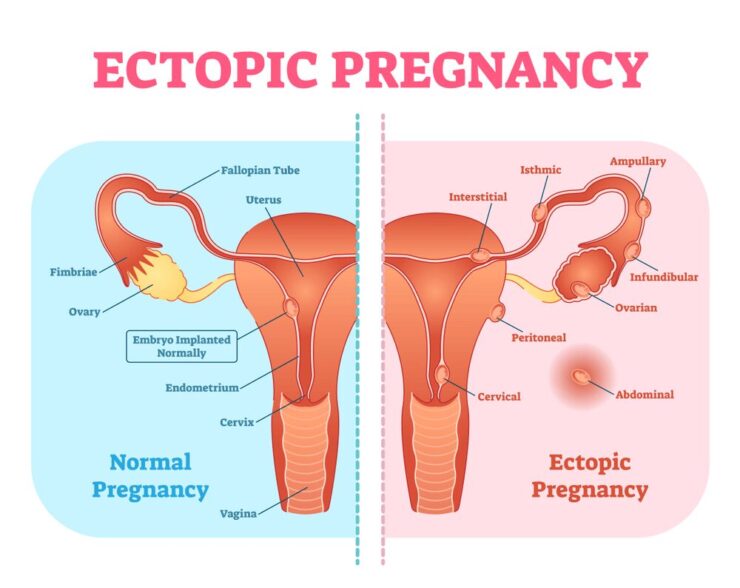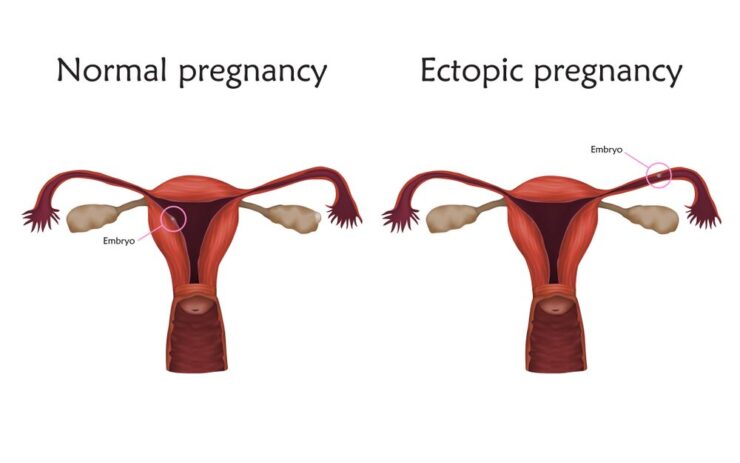Pregnancy is the process during which the sperm of the male fertilizes the egg in the female and then the fertilized egg moves towards the uterus where it starts to develop into a 9 month old fully developed baby.
So in normal pregnancies the fertilized egg develops inside the uterus whereas in the ectopic pregnancy the fertilized egg fails to travel towards the uterus which is why it attaches itself to another abdominal part for development.
In most cases the ectopic pregnancy takes place when the fertilized egg attaches itself to the fallopian tubes in the female body and starts to develop instead of developing in the uterus. Other than the fallopian tubes, the fertilized egg can also attach itself to the abdominal cavity or the cervix for development.
Any other place other than the uterus in the female body is incapable of providing the fertilized eggs with the necessary requirements for development due to which ectopic pregnancy leads to an abnormal pregnancy which needs to be treated right away in order to avoid serious medical complications. Thus you must treat ectopic pregnancy as a medical emergency.
The common name of ectopic pregnancy is Tubal Pregnancy because of the fact that it mostly takes place in the fallopian tubes. According to a researched carried out by the American Academy of Family Physicians (AAFP), the ratio of ectopic pregnancy to normal pregnancy is 1:50. This means that one out of 50 pregnancies is an ectopic pregnancy.
Table of Contents
What causes an ectopic pregnancy?
Every medical condition is a result of something bad happening in the body. The same is the case with ectopic pregnancy. In Ectopic pregnancy, the fertilized egg fails to travel to the uterus and starts to develop somewhere in the fallopian tubes or the abdomen.
The cause of ectopic pregnancy is not always clear. Doctors might not know why the implantation of the egg in the uterus didn’t take place normally. But there are certain conditions that have been linked to ectopic pregnancy. Some of those ectopic pregnancy causes are;
1. Inflammation of Fallopian tubes
You might suffer from an ectopic pregnancy if there is some kind of inflammation in your fallopian tubes. This might be caused by an infection of a previous surgical procedure. Due to the inflammation and scaring the fertilized egg won’t be able to travel to the uterus.
2. Hormonal Imbalance
Hormones aid the body in performing its functions properly. Abnormal changes in the hormones can also affect the movement of the fertilized eggs from the fallopian tubes to the uterus.
3. History of ectopic pregnancy
Women who have suffered from ectopic pregnancy in the past have an increased chance of having it again. So if you have had one in the past then you must check for it the next time.
4. Tubal surgery
If you have had tubal surgery in the past then there is an increased risk of ectopic pregnancy. The irregular shape of the fallopian tubes may affect its pathway which will result in ectopic pregnancy.
5. Medical conditions
Some of the genetic and nonhereditary medical conditions can affect the shape and the condition of the fallopian tube which might result in an ectopic pregnancy.
6. Smoking
It has been observed that women who smoke before pregnancy are more likely to have an ectopic pregnancy as compared to the non-smoker moms. So the more you smoke the more chances are there of you having an ectopic pregnancy.
How early do symptoms of ectopic pregnancy start?
Ectopic pregnancy is quite common. In some cases women don’t even suffer from any of the ectopic pregnancy symptoms but women who do suffer from the symptoms have suggested that you can detect the symptoms in the first few week of pregnancy.
Ectopic pregnancy might feel the same as the normal pregnancy in the beginning. It is impossible to detect ectopic pregnancy on your own with the scans and other treatments in the first few weeks because you will experience the same symptoms as one does in normal pregnancy.
Plus there is no ectopic pregnancy test to help you detect it but every woman wants to know when the ectopic pregnancy symptoms start.
So there are no early signs of detecting an ectopic pregnancy. You might have missed your period, you might experience tenderness in your belly and your breast might be sore but all these symptoms are common in a regular pregnancy.
The symptoms of ectopic pregnancy start to show once the fertilized egg starts to grow in size. In the first 1-3 weeks the egg is still small in size thus it can’t be detected in the fallopian tubes.
Once the egg starts to develop, the increased size causes discomfort in the fallopian tube and might rupture them as well which causes vaginal bleeding and lightheadedness.
In most cases the women start to detect ectopic symptoms in the 5th week of pregnancy but the range varies from 4 to 12 weeks.
Everyone suffers from different symptoms at different times during the pregnancy but the most common ones are vaginal bleeding, pelvic pain and of course the missed period.
If you do feel severe pain in the pelvic region or the abdominal region and experience a lot of vaginal bleeding in first few weeks of the pregnancy then you should consult your doctor immediately because it could be lift threatening
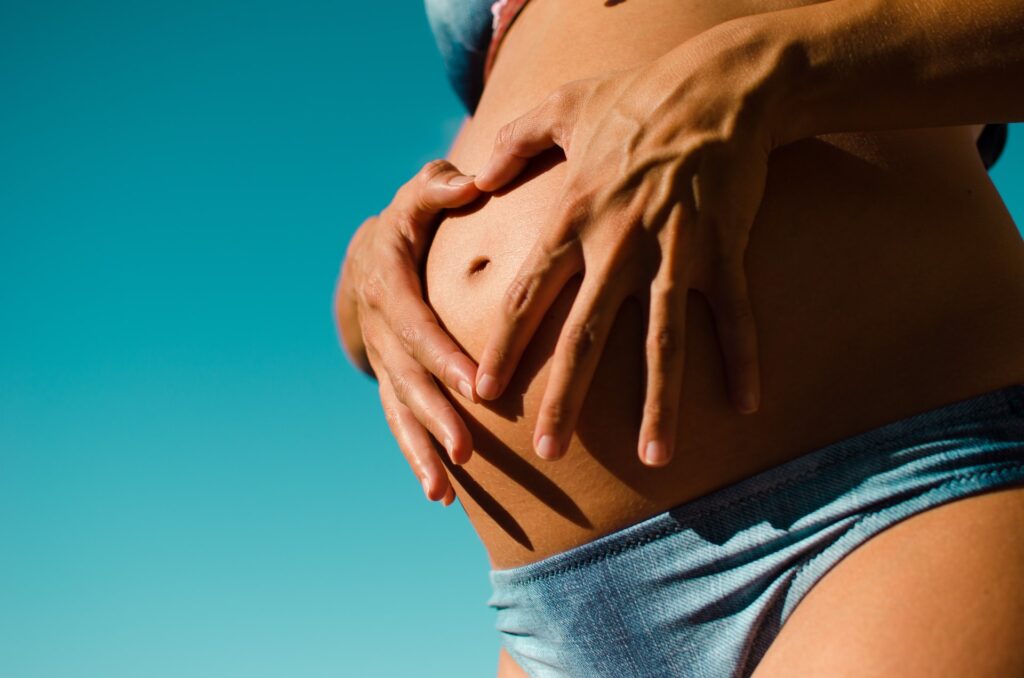
if you treated immediately. If you have had an ectopic pregnancy in the past then you should be extra vigilant and should keep a lookout for even the small symptoms of ectopic pregnancy.
Complications of ectopic pregnancy after surgery
Ectopic pregnancy is quite dangerous which is why you must get it treated right away. In severe cases a women must get the ectopic pregnancy removed surgically but there are certain complications that are linked to the ectopic pregnancy after surgery.
Abdominal surgery can increase your chances of an ectopic pregnancy. Any surgical procedure linked to the reproductive system of the women or affects the fallopian tubes decrease the chances of a normal pregnancy.
There are certain complications that might arise after the surgery but your gynecologist will discuss them with you in detail. The major complication with the surgery is that you might not be able to conceive in the future due to the damage done to the fallopian tubes.
It is always better to know about the complications related to your ectopic pregnancy surgery beforehand. The range of complications depends on the procedures that are carried out during the surgery and your history.
If the ectopic pregnancy lies in one of the fallopian tubes then the surgeon would have to cut the portion of the fallopian tube in order to remove the fertilized egg.
So if your fallopian tubes are affected due to the surgery then there are certain complications that you would have to face. In most cases only one of the fallopian tubes is affected and the women in left with a single healthy fallopian tube.
In this case you have 6 out of 10 chances of having a normal pregnancy in the future but if your fallopian tubes are completely damaged then unfortunately you might not be able to get pregnant in the future.
It is always better to consult different gynecologist before getting operated because a single complication can affect your fertility and in severe cases it might also cause death of the mother. So consult 2-3 professionals before doing anything serious.
Who is More at Risk of ectopic pregnancy?

It is very hard to detect an ectopic pregnancy. When it comes to the other forms of pregnancy loss you can always find one or two risk factors attached to it but in case of ectopic pregnancy there are very few risk factors which are not obvious in most cases.
The several risk factors which are associated with ectopic pregnancy are listed below. The risk factors are categorized into high risk, moderate risk, and low-risk factors. The higher the risk, the higher are the chances of an ectopic pregnancy.
High-Risk Factors
- Previous ectopic pregnancy – Women who have had an ectopic pregnancy in the past are more likely to suffer from it again as compared to the women who haven’t had it before.
- Abnormal fallopian tubes – Changes in the shape and the conditions of the fallopian tubes also increase the risk of ectopic pregnancy.
- Maternal DES use – The use of the drug DES increase the chance of the baby girl in the womb of the mother to develop congenital abnormalities of the uterus which then leads to ectopic pregnancy.
- Endometriosis – Endometriosis causes adhesions and scarring in the tissue which inhibits the fertilized egg to travel to the uterus for implantation.
- History of Tubal Surgery – Women who have had tubal ligation have high risk of having a tubal pregnancy.
Moderate Risk Factors
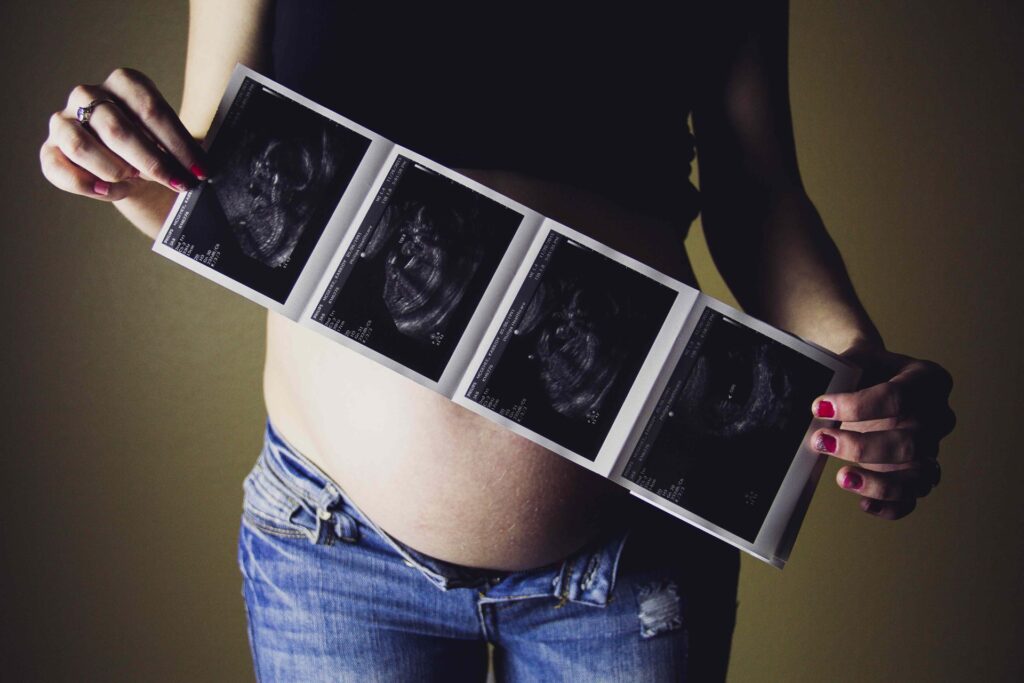
- History of sexually transmitted infections or pelvic inflammatory disease – STDs can cause inflammation in the pelvic region which can cause tubal pregnancy.
- History of infertility – Drugs that are used to treat infertility increase the chances of an ectopic pregnancy.
- Smoking – Women who smoke before pregnancy have a high risk of ectopic pregnancies as compared to non-smokers.
Low-Risk Factors
- Douching – Douching causes the bacteria in the vaginal region to move towards the fallopian tubes where it causes inflammation that leads to ectopic pregnancy.
- Past abdominal surgery – Women who have undergone abdominal surgeries like appendectomy or laparotomy have the risk of having an ectopic pregnancy.
- Age – Women who are over 40 have a higher risk of having an ectopic pregnancy.
What are the symptoms of an ectopic pregnancy?
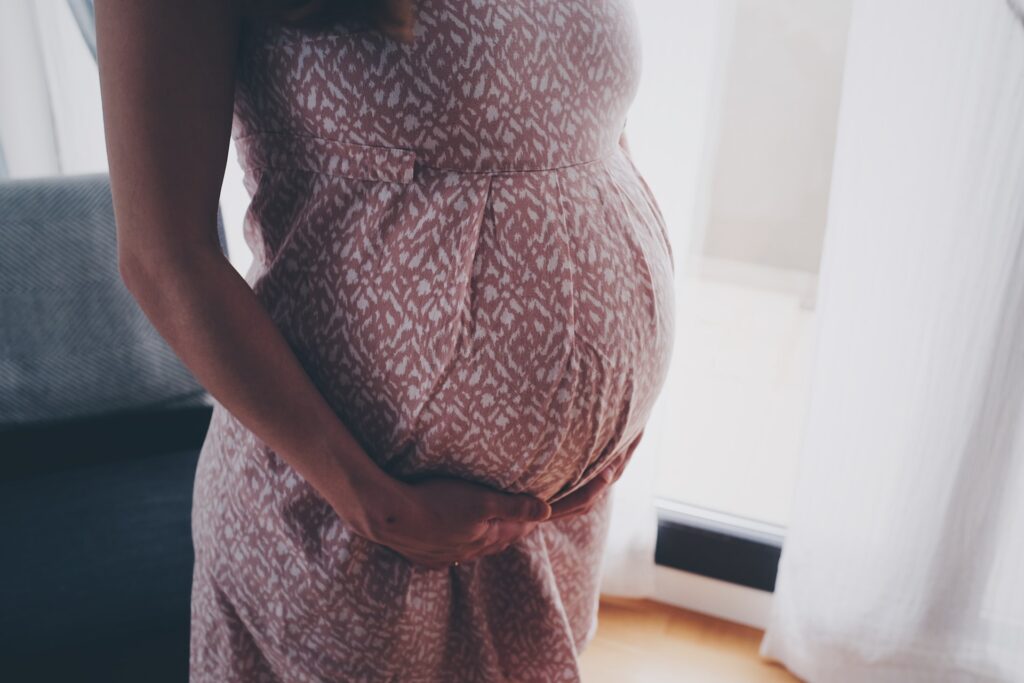
It is important for every woman to be aware of the symptoms of the ectopic pregnancy because it can take place in any sexually active women. There are a number of symptoms associated with ectopic pregnancy and it is not important for every woman with ectopic pregnancy to suffer from all of them.
Every case is different so the severity of the symptoms also varies from woman to woman. Some women might not even experience any of the symptoms but these cases are quite rare, mostly in the case where the woman has an irregular period.
In the first few weeks, ectopic pregnancy might feel the same as a normal pregnancy so you must be on the lookout for the symptoms of ectopic pregnancy to be safe. Some of the common symptoms of ectopic pregnancy that might look out for in the first few weeks so pregnancy are;
1. Missed period
If your period is late or you have missed your period you might be pregnant. You might experience the same symptoms as the regular pregnancy in the first few weeks but if you have some kind of light bleeding then you should not rule it out as a period because it could be vaginal bleeding as well so it is always better to take a pregnancy test.
2. Vaginal Bleeding
You should be able to differentiate between your period and vaginal bleeding. Bleeding during the period is heavy has a reddish color whereas vaginal bleeding has more of a brown/black color and it is not thick like your period.
You will notice watery flow during vaginal bleeding. If you are having constant vaginal bleeding then rush to the emergency ward to get it checked out for ectopic pregnancy.
3. Pregnancy test
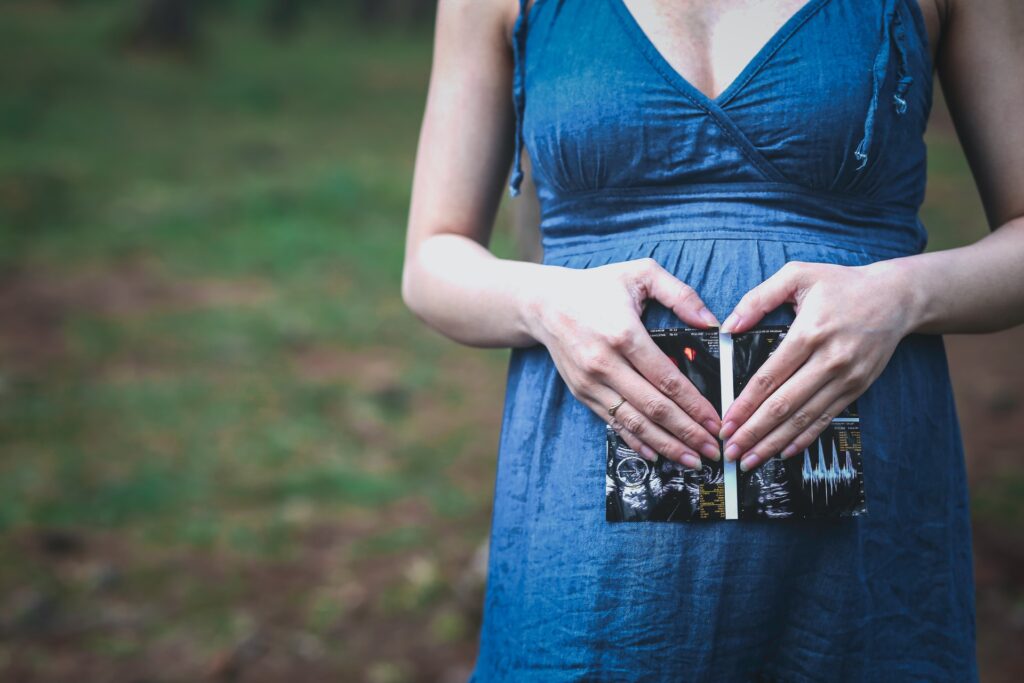
If the pregnancy test shows a negative result when you believe that it should be positive then you should run immediately to the doctor to get your hCG checked to make sure that the fertilized egg is implanted in the uterus and not somewhere else.
4. Abdominal Pain
It is common for pregnant women to experience abdominal pain in the lower belly region or the pelvic area but if the period like pain starts to gradually increase then you should look out for the following;
- Persistent pain in the one side of the abdomen
- Significant pain in the lower region of the abdomen or the back.
- Bloating or discomfort even when not full can be the result of internal bleeding.
- Shoulder Pain
Shoulder pain in ectopic pregnancy is caused due to internal bleeding. When the fallopian tubes get ruptured the blood starts to gather in the abdomen causing discomfort in the diagram which then causes the shoulder pain.
5. Collapse
Internal bleeding during an ectopic pregnancy can cause various other symptoms such as lightheadedness which can lead to fainting. You might start to lose your complexion and look a bit pale and due to blood loss, your blood pressure would also drop gradually.
Diagnosing an ectopic pregnancy
It is always better to diagnose and treat ectopic pregnancy as early as possible but the problem is that it is not always easy to diagnose an ectopic pregnancy. The symptoms of ectopic pregnancy are mostly familiar to the normal pregnancy in the women with child bearing age.
Clinical suspicion is the best way to diagnose ectopic pregnancy even before the appearance of the early signs and symptoms show up. There are others diagnoses available as well. Some of the ectopic pregnancy diagnoses are listed below.
- 1. History – It is always better to get a full-fledged physical examination crossed checked with your history to initially get started for your timely diagnoses. It is best to look for the common symptoms of ectopic pregnancy such as vaginal bleeding, tenderness in the abdomen and a missed period. You can also feel pain in the shoulder and the pelvic region depending on the location of the ectopic pregnancy. Your history will suggest whether these symptoms are linked to ectopic pregnancy or not.
- 2. Speculum and bimanual examination – This is also a common diagnosis of ectopic pregnancy but the problem with it is that the findings of the test are non-specific. The results of the tests include: abnormal enlargement of the uterus which isn’t the expected size for pregnancy and uterine or cervical motion tenderness
- 3. Pregnancy test: In the case of ectopic pregnancy your urine pregnancy test will give positive results.
- 4. Ultrasonography: Ultrasounds are most commonly used to diagnose ectopic pregnancy but you might have to wait for weeks to get accurate results. It is common in the case of extrauterine pregnancy and intrauterine pregnancy.
- 5. Test to detect serum β-human chorionic gonadotropin (b-hCG) – b-hCG is a hormone that is found in the bloodstream during pregnancy thus it is known as a pregnancy hormone. B-hCG can be detected in the blood in the first weeks of a normal pregnancy but in case of normal pregnancy the level of the hormone increases 68% every 48 hours whereas in case of ectopic pregnancy the rate of increase is much slower than normal pregnancy. If your b-hCG level is less than1500 mIU/mL then it is predictive for ectopic pregnancy.
- 6. Laparoscopy – This diagnosis is used for patients who show multiple signs of ectopic pregnancy and are hemodynamically unstable.
It is always better to get tested for different diagnoses such as urine pregnancy test, a transvaginal ultrasound and maybe a serum hCG to diagnose ectopic pregnancy in the early stages so that the ectopic pregnancy treatments can be followed accordingly.
Ectopic pregnancy surgery recovery time
There are various treatments that can help solve an ectopic pregnancy but if the pregnancy has progressed then surgery is the only option left. Surgery has a huge impact on the woman’s body. Along with the physical trauma the woman also goes through an emotional trauma.
It takes a lot of time to recover from ectopic pregnancy surgery. Physical recovery only takes a few weeks but in the case of emotional recovery, the mother might need some time depending on how much she is affected by the loss of the child.
Physical recovery
The physical recovery of the mother depends on the surgical procedure that was used to remove the ectopic pregnancy. In the case of laparoscopy surgery, it takes almost 2 to 3 weeks for the mother to recover whereas in the case of laparotomy surgery it takes about 6 weeks for the mother to recover. The time taken depends on the extensiveness of the procedures and the diet and the medication used by the mother.
In most cases women with laparoscopy surgery can continue with their regular activities for two weeks or in severe cases it might take then three to four weeks tops but the surgical procedure that uses laparotomy can take one or two months to recover. So it is advised that you take 4-6 weeks to continue your daily activities so that your incisions are not affected by the hard work.
Emotional recovery
Emotional recovery might take some time. It is noticed that the emotional recovery period varies from mother to mother. It depends entirely on the emotions that the mother is going through because of the loss of the baby. The emotional support that she gets from her family and friends also affects the recovery time.
There are some tips that might help you recover from the emotional trauma faster. It is advised that you talk to a trusted friend or a professional and tell them how you feel. You can also join a support group to recover faster.
It is advised that you do the stuff that you like and be around people who support you emotionally and do those things to cheer you up. Try not to stay alone. It is better to surround yourself with people who support you both emotionally and physically.
What to expect after ectopic pregnancy surgery?
Surgery is a huge thing for your body to cope up with which is why it is important that you have physical and emotional help with you whenever requires.
In most cases, you have the chance to mentally prepare yourself for surgery but in case of an ectopic pregnancy surgery you don’t get a warning and there is no alternative other than surgery thus you might suffer from the post-surgery symptoms for weeks.
After an ectopic pregnancy, you will suffer from both physical and emotional trauma. Physical damage is something you can recover much faster from as compared to the emotional trauma that you suffered from.
You will start to blame yourself for the loss of the child, but remember that there is nothing that you could have done to save the child.
You will have to go easy on yourself especially your body because it won’t be able to bear pain or lifts as it used to. Your switches will take time to recover so do not push yourself because you might cause extra damage by straining yourself.
It is always better to let your body relax for a couple of weeks before you continue your regular life.
In most cases, women still feel pregnant for a couple of weeks after the surgery and experience the pregnancy symptoms such bloating and sore breasts but all these are just the after-effects of the ectopic surgery that you just went through.
Your body will take some time to balance the hormones in the bloodstream and get your body back to normal working conditions.
Pain after ectopic pregnancy surgery
An ectopic surgery is a huge thing for your body to cope up with which is why you might suffer discomfort and pain in some of the body parts. You might also feel pain in the parts other than the ones affected by the surgery.
This is quite common because during surgery you are under anesthetics thus your muscles are relaxed and the operating staff moves you according to the needs of the operations. Thus your body might need time to recover from the anesthetic and get the relaxed muscles back in motion. So your body might hurt a bit in the back of the shoulder region.
You might also experience pain before your first period after the ectopic surgery.
This is because your body tries to resume the normal cycle of ovulating which might be hard for the reproductive system to cope with this you will experience pain before your first period.
The pain and the discomfort will last for a couple of weeks after the surgery until all the scars are healed. But if you still experience discomfort in the abdominal region after several months then you should definitely contact your doctor because it might be the result of some adhesions caused by surgery.
An adhesion is the scaring of the internal muscle tissues which might be affected due to the ectopic pregnancy surgery. The common places where you might experience the adhesion pain are the pelvic region and your stomach.
You need to remember that pain is common after a major surgery which is why you will suffer from it for several weeks. It is just a way through which your body tells you to rest so you don’t have to fuss about minor pain experiences. There are certain cases in which you might need to contact your doctor. This is only when your pain is prolonged than the normal time period and is followed by other symptoms such as vaginal discharge, high fever, and affected scared area.
Bleeding after ectopic pregnancy surgery
Ectopic pregnancy is quite scary for the mother which is why after the ectopic pregnancy surgery the woman gets worried over every little detail. One of the major things that the women worry about is the bleeding after the surgery.
Bleeding is quite common after the surgery. Most women classify it as their first period after the surgery but that is not true. During the ectopic pregnancy the beta hCG hormone level increases which leads to the development of the womb. The womb starts to prepare itself for the pregnancy but as a result of the surgery, the pregnancy is terminated.
So after the surgery, the beta hCG levels start to drop due to which the thickened uterine lining starts to break down which leads to bleeding. The bleeding means that you are no longer pregnant so the uterus has shed its lining.
The vaginal bleeding after the surgery seems similar to your period which is why most common have I confused with the period. The appearance of the blood is thick, dark, and clotty. The duration of the bleeding varies from woman to woman. The bleeding depends on the level of hCG in your uterus; if it is high then you will bleed more whereas if it is low you would bleed less.
In normal cases, women bleed for one to two weeks but certain women have also reported that they bleed for six weeks. The difference depends on how far you were pregnant. The farther you are pregnant the stronger the lining of the uterine wall would be which means that you will bleed more as compared to the women who are only pregnant for 3-4 weeks.
If the bleeding after the surgery seems normal to you and the pain that you experience is manageable with some pain-relieving pills then there is nothing to worry about but if the bleeding lasts for more than one month and your experience extremely unbearable pain then you should contact your doctor immediately.
Side effects after ectopic pregnancy surgery
Every surgery comes with some complications. In the case of ectopic pregnancy, there are certain major complications and side effects that you should know about. Your doctor will most likely educate you on the topic before proceeding with the surgery.
In rare cases, the side effect of an ectopic pregnancy surgery is that even after the surgery a small portion of ectopic pregnancy tissue might be left behind which can then again grow and affect the fallopian tubes. In such cases, the hCG levels should be monitored for weeks in order to ensure that they drop eventually and if they don’t then the tissue should be removed through another surgery or using MTX.
In most cases, the side effect the ectopic pregnancy surgery is that you might be able to conceive normally in the future.
If your ectopic pregnancy lies in the fallopian tubes then in order to remove it the doctors would have to cut the portion of the fallopian tubes due to which one or both the fallopian tubes can get damaged.
If only one of your fallopian tubes is damaged then there are chances of you having a normal pregnancy is the future but if both the tubes are ruptured then it might case infertility.
It is always better to get your ectopic pregnancy treated early because surgery increases the chances of infertility.
Another side effect of the ectopic pregnancy surgery is that during the surgery something might go wrong which will affect your reproductive system in a negative way.
The most common of the side effects is the adhesions that result from the surgery. The tissues in the fallopian tubes might get tangled up which will increase the chances of ectopic pregnancy in the future.
There are certain other minor side effects of ectopic pregnancy surgery. You might still feel pregnant after the surgery. Your breasts would be sore for weeks and you will experience abdominal pain for 2 to 3 weeks until the incisions are all recovered.
How to Prevent Ectopic Pregnancy?
It is impossible to prevent an ectopic pregnancy because the process is natural and there is nothing that you can do to change that. Even though you can’t control an ectopic pregnancy but there are certain actions that you can take in order to decrease the chances of an ectopic pregnancy.
There are certain risk factors that are associated with ectopic pregnancy. By taking control of your everyday life and avoiding those risk factors can help you decrease your chances of pregnancy. Some of the preventative measures that you can take are;
1. Limit the number of sexual partners
If you have multiple sexual partners then the chances of having an ectopic pregnancy are increased. More sexual partners mean that you will be exposed to more sexually transmitted diseases which will affect your reproductive system and will lead to an ectopic pregnancy.
2. Avoid abdominal surgeries
If you are planning on having a baby then it is better that you avoid any of the abdominal surgeries because surgery can cause adhesion and scare inside your reproductive system which might affect the normal flow of the fertilized egg from the fallopian tubes to the uterus.
The fertilized egg might stick to the adhesions and stay in the fallopian tubes causing an ectopic pregnancy. Or the complications in the surgery might affect the pathway causing the egg to stick to the abdomen or the cervix.
3. Avoid smoking
It has been reported that women who smoke have higher chances of having an ectopic pregnancy as compared to women who do not smoke. So it is advised that you quit smoking a few months before you start conceiving in order to prevent an ectopic pregnancy.
4. Practice safe sex
Inflammation in the abdominal region can also cause an ectopic pregnancy which is why it is advised that you always ask you, partner, to be clean or use a condom before sexual intercourse in order to avoid sexually transmitted diseases because they can lead to inflammation in the pelvic region which might lead to an ectopic pregnancy.
5. Food to prevent ectopic pregnancy
Ectopic pregnancy is natural which is why there is no homemade remedy or a medical procedure that can help you prevent it. Some women think that their diet might also be the cause of an ectopic pregnancy. Well there is no scientific evidence to this myth so there is nothing that we can say for sure.
But we all know that in order for our body to function properly we need to consume a healthy diet and when we talk about a healthy diet we are talking about the essential nutrients that our body needs in order to function properly.
In order to have a healthy pregnancy, it is advised that you consume natural home cooked foods. Try to stick to fresh fruits and vegetables and avoid eating processed or canned foods. Also, get your food from a clean grocery store before dirt on your food items can lead bacteria right inside your stomach where it will cause infections that might also affect your reproductive system.
You should also consume freshly cleaned water. Try to drink at least 8 glasses of water in order to make sure that your body is hydrated. If you are planning on getting pregnant then it is advised that you leave all the raw and under-cooked meals to avoid infections and food poisoning. Also, quit smoking to make sure that the pregnancy goes on smoothly without any complications.
Eating healthy might not prevent ectopic pregnancy but it for sure will lead to a healthy pregnancy if natural complications do not occur during the process so it is advised that you consume a healthy adequate diet on daily basis to prevent an ectopic pregnancy.
FAQs:
1. What are the signs of ectopic pregnancy at 2 weeks?
Even though it is better to diagnose an ectopic pregnancy as soon as possible to avoid side effects and life threating outcomes but there is no way to detect it in the 2nd week of pregnancy. In the second week of pregnancy, your fertilized egg is too small to be detectable.
Your beta hCG levels might increase due to which you will see a positive sign on the pregnancy test but there is no way to tell whether the pregnancy is normal or ectopic. The ultrasounds can detect the embryo this early which is why at 2 weeks you will only experience symptoms that are common in a normal pregnancy.
So it is common to experience nausea in the 2nd week of pregnancy along with lightheadedness. You might also start to feel hungry often and crave certain kinds of food. Your breasts will become a bit tender and swollen as the result of the pregnancy hormone.
Plus you might also experience vaginal discharge which is quite common during normal pregnancy. Your body will start to eliminate white, thin, and milky like discharge to prepare the uterus for pregnancy. So you will not experience any of the ectopic pregnancy symptoms in the first two weeks because it is still early for diagnoses.
2. What are the signs of ectopic pregnancy at 3 weeks?
It is impossible to locate the growing embryo inside the reproductive system in the first few weeks of pregnancy. You might not even experience any of the pregnancy symptoms at this stage because it is still early. In the case of ectopic pregnancy if the egg is stuck inside the fallopian tubes that you might experience slight discomfort in the abdominal region but this symptom is not enough to rule the pregnancy as an ectopic one.
The major symptom of a pregnancy is a missed period which also implies in case of an ectopic pregnancy. If you are 3 weeks pregnant then you are most likely going to experience the symptoms linked to normal pregnancy such as sore breasts, tiredness, morning sickness and etc. You can go for a regular checkup if you have added an ectopic pregnancy in the past but it is unlikely that the ultrasounds would be able to detect the sac in the fallopian tubes.
If the growth rate of the embryo is fast then you might experience pain in the pelvic region which might be the effect of the growing egg exerting pressure inside the walls of the fallopian tubes. You will experience nausea and vomiting along with some dizziness as well.
3. What are the signs of ectopic pregnancy at 5 weeks?
Symptoms of pregnancy are undetectable and unique. It is uncommon for two women to experience the same symptoms of pregnancy. Even in the case of an ectopic pregnancy, a woman might experience all three major symptoms which are a missed period, vaginal bleeding, and abdominal pain.
By the 5th week of pregnancy, the fertilized egg has grown quite a bit. In the 5th week, the major organs of the baby start to develop which is why you might start to experience the symptoms of ectopic pregnancy during the 5th week. When the baby starts to develop in the fallopian tubes, the sac starts to exert pressure on the walls of the fallopian tubes which causes bleeding and abdominal pain.
Vaginal bleeding and abdominal pain are the most common symptoms that you are likely to experience in the 5th week of an ectopic pregnancy. Some women might not experience vaginal bleeding at this stage but abdominal pain is a must symptom. You might also experience pain in one side of the pelvic region or the whole of the pelvic region. Shoulder pain is also a common symptom experienced in the 5th week of an ectopic pregnancy.
4. What are the signs of ectopic pregnancy at 6 weeks?
In the 6th week of pregnancy, the baby has developed a bit which is why the sac of cells in the fallopian tubes or any other place besides the uterus will start to affect the reproductive system of the mother. If the growth rate of the sac of cells is high then you can also experience a ruptured fallopian tube in the 6th week.
It becomes easier for the gynecologists to detect the sac in the fallopian tubes by the 6th week. The position of the sac also becomes visible which is why it can be treated immediately. There are certain symptoms that you might experience in the 6th week which will indicate an ectopic pregnancy.
The most common symptom is abdominal pain. You can experience it on one side of the pelvic region or at both the side of the pelvic region. Your belly and your breasts will become sore and you might experience bleeding that is similar to a heavy period. The moment you experience bleeding you should rush to the doctor to get it checked out.
You might also experience symptoms that are linked to normal pregnancy. Morning sickness and tiredness are common. Whereas food craving, mood swings, and constipation can also result in an ectopic pregnancy after all your body is preparing you for pregnancy.
5. What are the signs of ectopic pregnancy at 7 weeks?
An ectopic pregnancy becomes visible in the 7th week. If you are going for regular checkups then your doctor will immediately be able to spot the abnormal sac-like structure growing inside of your fallopian tubes using an ultrasound.
By this point in time, you will experience the three major symptoms of ectopic pregnancy which are; a missed period, vaginal bleeding, and abdominal pain. If you haven’t taken a pregnancy test and you feel severe abdominal pain and dark heavy spotting then you should take a pregnancy test to confirm your pregnancy.
The other common symptoms of ectopic pregnancy in the 7th week include nausea and vomiting which are common in normal pregnancy as well. You might experience dizziness and pain in one side of your body. Your pelvic region will start to hurt and due to internal bleeding, your nerves might be disturbed which will cause pain in your shoulder.
By the 7th week of pregnancy, the embryo has developed a lot which is why the fallopian tubes won’t be able to hold it much longer. Due to the constant pressure, your fallopian tubes might explode and cause heavy vaginal bleeding. If such an incident takes place then it is advised that you rush to the emergency pregnancy ward immediately to avoid death.
6. How does an ectopic pregnancy feel like?
An ectopic pregnancy feels different to different women. It is quite common for someone to not even suspect that they have an ectopic pregnancy in the first few weeks of pregnancy. On average women find out about the ectopic pregnancy in the 5th week because by the 4th week the embryonic sac is too small to be detected from an ultrasound.
So in the first few weeks, you might feel the same as the normal pregnancy. Your symptoms might also be the same so you might even know about it. But as the week progress and the fertilized eggs start to grow in size it will start putting pressure on your fallopian tubes which will cause severe pain in the abdominal region. As a result, you will experience heavy bleeding during your pregnancy. In some cases, you might also experience pain in your shoulder tip.
7. Ectopic pregnancy vs. Normal pregnancy
Most people believe the when the sperm of a male fuses with the egg of the female, a child is conceived. For them, that is all the pregnancy is about but that is not all. Pregnancy is the nine-month period during which the fertilized egg develops into a baby in the uterus on the mother.
In the normal pregnancy, the sperm fuses with the egg in the fallopian tube and stays there for 3-4 days and then travels to the uterus where it attaches itself and starts the development phase.
Whereas in the case of ectopic pregnancy the fertilized egg attaches itself to the abdominal region, the fallopian tubes, or the cervix because it is unable to travel to the uterus due to some kind of blockage. So when the fertilized egg attaches itself to a place other than the uterus it is known as ectopic pregnancy.
8. When does ectopic pregnancy pain start?
The ectopic pregnancy is detected by severe pain in the abdominal region, the pelvic region, and vaginal bleeding as well. In some rare cases, the women with ectopic pregnancy might not even feel the pain but in most cases, the women start to experience discomfort and mild or severe pain in the pelvic region in the first few weeks of the pregnancy.
Everyone experiences pain at different points during the pregnancy so you can experience ectopic pain the first 2 to 8 weeks of pregnancy. It could be mild just like in normal pregnancy or it could be quite severe due to the rupturing of the fallopian tubes.
The moment you start to feel severe pain which doesn’t feel normal to you, you should contact your doctor immediately and set up an appointment to check it out.
9. What is the ectopic pregnancy bleeding color?
Bleeding is one of the major symptoms of an ectopic pregnancy which is why you might get worried when you noted spotting during pregnancy. Well, spotting is quite common during pregnancy but it can also mean different things.
Bleeding during pregnancy may be normal or it could be an indication of an ectopic pregnancy. In both cases, the color of the blood will help you identify whether it is implantation bleeding or ectopic pregnancy.
In the case of ectopic pregnancy, the color of the blood would be dark red or blackish in color. The bleeding would be heavy similar to a heavy period. Plus you will also notice blood clots in the bleeding which will give the bleeding a dark textured color. So if you notice that you are bleeding heavily during pregnancy then you should immediately rush to the emergency to get it treated.
10. What is the difference between implantation bleeding and ectopic pregnancy?
It is quite common for women to bleed during the first few weeks of pregnancy. It is also normal for a woman to get worried if she experiences bleeding during pregnancy because some women are unable to distinguish between implantation bleeding and bleeding that takes place during an ectopic pregnancy.
Implantation bleeding takes place when the fertilized egg attaches itself to the uterine wall and starts the developing process. In normal course implantation bleeding is light brown in color and the colored vaginal discharge doesn’t have clots in it. The duration of the implantation bleeding lasts for a few hours to a few days.
In the case of an ectopic pregnancy, vaginal bleeding occurs due to the rupturing of the fallopian tubes. The color of the blood is dark and it has clots in it. It might seem like a heavy period and you will also experience abdominal pain along with it.
11. What is the difference between implantation bleeding and period?
There are many symptoms of pregnancy and one of them is implantation bleeding. The thing with implantation bleeding is that it varies from woman to woman. There are certain women who do not experience implantation bleeding but as it is a common symptom women want to know about it.
But the problem is that you experience implantation bleeding almost a week before you are expecting your period which is why you might get confused about whether it’s your period or implantation bleeding.
The difference between implantation bleeding and period is the duration of bleeding, the color of the blood, and the flow of blood. In case of implantation bleeding the color is pink to light brown and the bleeding is extremely light without any clots and lasts for a few hours or 2-3 days.
Whereas in bleeding during periods is heavy and have clots and is darker in color. Plus it lasts for 4-7 days on average.
12. What is the pain location in ectopic pregnancy?
Ectopic pregnancy is detected with throbbing pain. In some rare cases women might not experience any kind of pain but in most cases, ectopic pregnancy causes severe pain in the pelvic region or the abdomen. Women mostly feel pain in the one side of the pelvic but you can also feel it in the overall region as everyone experiences different symptoms.
The pain in the abdomen and the pelvic region are caused due to discomfort in the fallopian tube or because of the rupturing of the fallopian tube. If you have a ruptured fallopian tube then you would experience severe pain that is intolerable. So you should immediately go for an emergency because it can be life threating as well.
13. What is ectopic pregnancy hip pain?
The first symptom of ectopic pregnancy is severe or mild pain in the abdominal region. Apart from the abdominal region, you can also experience pain in the pelvic region and even in your shoulder and neck region.
The pain is mostly the result of ruptured fallopian tubes due to which the blood begins to gather in the region. The flooded blood starts to irritate the nerves in the region which then fails to function properly.
Ruptured fallopian tubes can cause severe pain in the pelvic region which is the hip region of your body. So if you experience any kind of mild to severe pain in the region during the first few weeks of pregnancy then you should consult your doctor to figure out whether you are having are ectopic pregnancy or not. It is always better to treat as soon as possible to eliminate future risk.
14. Does ectopic pain come and go?
You might experience pain in different places during an ectopic pregnancy. In most cases, pain is one of the warning signs of an ectopic pregnancy. So you might experience it in the first few weeks of the ectopic pregnancy.
Most moms would ignore the pain warning sign because it isn’t consistent. This happens in a lot of cases as the patients and even the doctors would treat the pain as something else which results in serious complications.
The pain during ruptured ectopic pregnancy can vary on a scale from dull to sharp. So you might feel severe of mild pain during the ectopic pregnancy which may feel like the pain is coming and going. So consult your doctor when you experience pain for the first time during pregnancy so that you can figure out what the problem is and treat it as soon as possible.
15. Can ectopic pregnancy take place without bleeding?
Bleeding is one of the major symptoms of ectopic pregnancy but there are certain rare cases in which women with ectopic pregnancy do not experience vaginal bleeding. Most women will take this as a concern but you need to understand that ectopic pregnancy can take place in the fallopian tubes, the cervix, and the abdominal cavity. So the symptoms vary according to the position of your ectopic implant.
Not all women suffer from the same symptoms which is why it is important you keep in mind all the other symptoms of ectopic pregnancy as well and check whether you have them or not. If you feel like you might have ectopic pregnancy due to some reasons (history of previous ectopic pregnancy, fertility treatment and etc.) then you must visit your doctor right away and get it checked as soon as possible to stay on the safe side.
Conclusion
Ectopic pregnancy is becoming quite common which is why it is important that every woman who is thinking of getting pregnant should know about it in detail. The more you are familiar with the symptoms and the risk factors, the more you can do to avoid it and ensure a healthy and safe pregnancy.
You should never ignore a late period or vaginal bleeding because these are the basic and the first symptoms of an ectopic pregnancy. It is important that you visit the nearest emergency ward as soon as you experience internal bleeding (which is indicated by severe abdominal pain) or persistent vaginal bleeding because ectopic pregnancy if not treated right away can be life threating for the moms.
Educate yourself on the topic of ectopic pregnancy and we hope that you have a safe and healthy pregnancy and a beautiful baby. Good Luck with your pregnancy!

